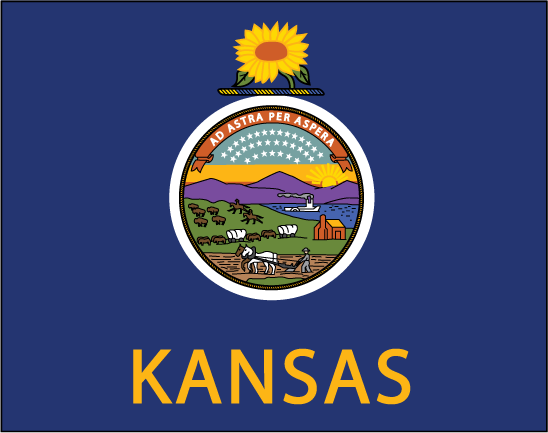With Daniel Woodson as Acting Governor, the legislature proceeded to adopt the Missouri statutes virtually in toto, merely instructing the clerk to strike out "Missouri" and insert the name of the Territory. Only on the subject of slavery did it show originality. Its enactments on this issue, known as the "Black Laws," provided a death penalty for anyone who, by word or deed, should aid in freeing a slave, and a penitentiary sentence for holding an opinion adverse to slavery. Reaction to these measures was widespread, with newspapers of the North and even some of the South protesting. The proslavery party prepared to enforce them through the Law and Order Society, which was organized on October 3, 1855, at a meeting in Leavenworth.
Meanwhile Free State advocates countered with a government of their own. In an assembly at Big Springs on September 5, 1855, the acts of the "bogus legislature" were repudiated, the Free State party was formally organized under the leadership of James H. Lane, and delegates were appointed to a constitutional convention which assembled at Topeka on October 23. Here a constitution was drafted and State officers were nominated; at a general election, held December 15, the constitution was ratified, Dr. Charles Robinson was elected Governor, and Lane and Reeder were sent to the United States Senate. They were not seated, the United States Senate refusing to recognize the election.
Nor was this the only move of the Free State party. In April 1855 Dr. Robinson, as agent of the New England Emigrant Aid Company, sent an order to Eli Thayer for 100 Sharp's rifles, which were promptly dispatched and became known as "Beecher's Bibles." These were followed in July by a second shipment which included a small brass cannon. The rifles had a somewhat quieting effect, but it was the quiet before the storm. Through the summer and fall of 1855 animosity smoldered, awaiting only an excuse for an open break. On November 21 Charles W. Dow, a Free State man, was shot and killed by Franklin M. Coleman, a proslavery man, in a quarrel over claim boundaries. Coleman surrendered to the sheriff of Douglas County and was released on bond; Dow's friends organized a posse to bring the murderer to justice. A member of this posse was arrested by the sheriff on a trumpedup charge and was promptly rescued by his friends. These events culminated in the threatened invasion of Lawrence, known as the "Wakarusa War." Border ruffians from Missouri gathered on Wakarusa Creek for the purpose of sacking the town and were deterred only by the intervention of Governor Wilson Shannon and United States troops from Fort Leavenworth. But before order was established a second Free State man, Thomas Barber, had been murdered.
Displeased with Governor Shannon's interference and bent on the destruction of Lawrence, the proslavery party bided its time until the following May, when a second invasion resulted in a partial destruction of the town. Three days later, May 24, John Brown retaliated with the execution of five proslavery men in the Potawatomi Massacre. Brown's action, the first retaliatory move on the part of the Free Staters, unleashed the extremists of both sides. Captain Henry C. Pate, Deputy United States Marshal, under pretext of arresting Brown, instigated fighting on the south side of the Kansas River, resulting in the battles of Black Jack, Franklin, and Fort Titus, the raiding of Palmyra and Prairie City, and the sacking of Osawatomie. On the north side of the river, at the towns of Atchison, Doniphan, and Leavenworth, Free State families were ejected from their homes and driven out of the Territory. A blockade was established on the Missouri River to prevent further Free State emigration. Lane raised his "Army of the North," and James Montgomery organized reckless young Free Staters into a guerrilla band known as the "Jayhawkers."

